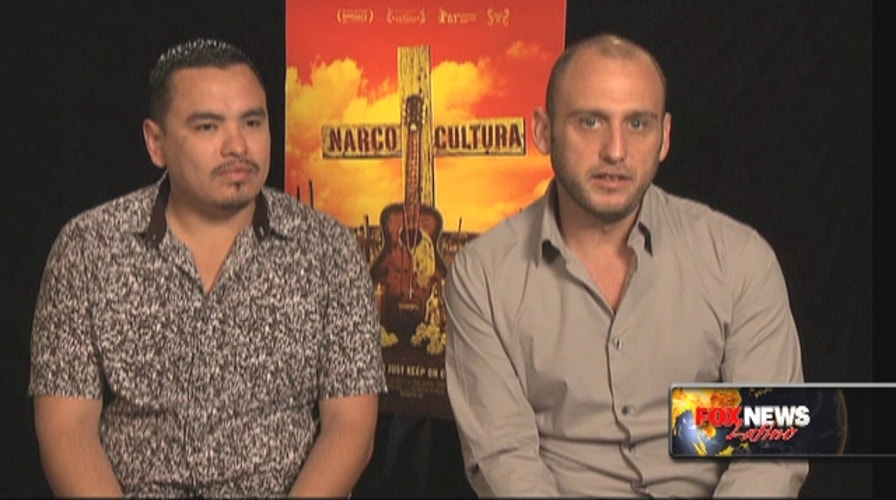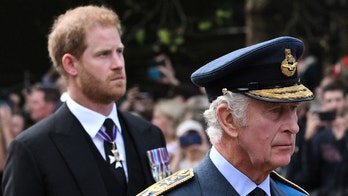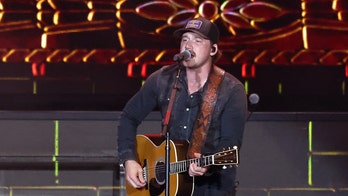'Narco Cultura' Chronicles Drug War Pop Culture
Filmmaker Shaul Schwarz and musician Edgar Quintero talk about 'Narco Cultura,' their new documentary that chronicles pop culture within the drug war.
Once considered the murder capital of the world, Ciudad Juárez, Mexico — a battleground for drug lords — is still one of the bloodiest and most dangerous cities on the planet. The ongoing violence has created a musical genre that has become known as "narcocorridos," ballads that glorify the extravagant lifestyles of cartel leaders, legendary shootouts and unapologetic machismo.
In 2008, Israeli filmmaker Shaul Schwarz was on assignment in Juárez photographing the cycle of violence and he saw an opportunity.
"Once I understood how it affects millions, how there is a culture in the making, I really felt a need to make this movie and so I kinda jumped in there," Schwarz said in an interview with Fox New Latino in Los Angeles.
Over the course of two years, Schwarz chronicled the drug cartels' pop culture influence on both sides of the border in his documentary "Narco Cultura." The film follows two main characters, Richi Soto, a Juarez crime investigator on the front line of Mexico's drug war, and Los Angeles narcocorrido singer/songwriter Edgar Quintero.
"I'm making somebody happy with a two-minute song, whether it be a good or bad guy," Quintero told Fox News Latino.
Narcocorridos have millions of fans and are part of the growing trafficking culture in the United States. There are blogs and websites that follow the latest news on the biggest Mexican drug kingpins. This underground culture has its own dress code and dictates what kind of car to drive. There are hundreds of night clubs in the United States playing these drug ballads to thousands of fans.
According to Schwarz, this phenomenon was inevitable.
"Of course there's going to be singers that are going to sing about and create entertainment about it, we can't blame the youth for what they want; we have to change the reality and listen to the youth and try to shape it," said Schwarz.
But Schwarz also said that the 'Narco Culture' affects people differently depending on what side of the border they live in. In the United States, he says, the narcocorrido culture is filling a void for many Latinos who are grasping for a sense of belonging in this country.
"Most of the kids going to those clubs are good Latino kids that are looking for an identity, they don't connect to rap, they don't have their own scene, " said Schwarz. "There's this kind of bad boy scene almost [like] playing Narco for a day, and then go home and be a regular person."
But Schwarz does admit that in Mexico, where poverty is abundant and hope is scarce, the message of narcocorridos takes on a different, more dangerous meaning.
"The fact that a girl in the movie would say something like 'I'd like to have a boyfriend that’s a trafficker,' shows you how kids grow today, it shows you that they see that the bad guys are winning in a sense, and it shows you what their dreams are," said Schwarz.
Narcocorridos have been heavily criticized for glamorizing a life of drugs, violence and crime, but Schwarz is also quick to defend the music that's come out of Mexico's harsh reality.
"If there was no drug war, Edgar [Quintero] wouldn't be singing these songs and people can’t hide it or hang the messenger about it, there is so much happening and we are expected to ... what? Put our head in the sand and say 'No, it’s not there'?"
Meanwhile, Quintero is torn between his love of music and the message behind his songs.
"It makes me happy that I'm doing something that I love but at the same time I am human, and it makes me sad that you know there's things going on like that with our neighbor Mexico."
When President Felipe Calderón took office in December 2006, he declared war on the powerful drug cartels in Mexico. Seven years later, "Narco Cultura" gives a clear picture of who is winning.
The film features mothers weeping uncontrollably, their sons gunned down in plain view on the streets of Juárez. Images of decapitated, burned and tortured bodies abound. It shows shopkeepers struggling in the face of extortion by outlaws who control the city.
Schwarz's documentary cuts from images of a desolate, bloody Juárez to scenes in the United States where singers like Quintero take a bazooka onstage as a prop while singing narcocorridos to excited fans. It juxtaposes the sharp contrast between Juárez and its U.S. counterpart, El Paso, that this year was declared the safest large city in the U.S. for the third straight year in a row.
The documentary puts a mirror on the narcocorrido showing that a song and its lyrics hold a different weight depending on what side of the border they are playing.
"Narco Cultura" premiered at the 2013 Sundance Film Festival. It was featured in this year’s Berlin International Film Festival as well as Hot Docs and Fantastic Fest. It will be released on November 22 in select cities including Los Angeles and New York and will have a national rollout on December 6.







